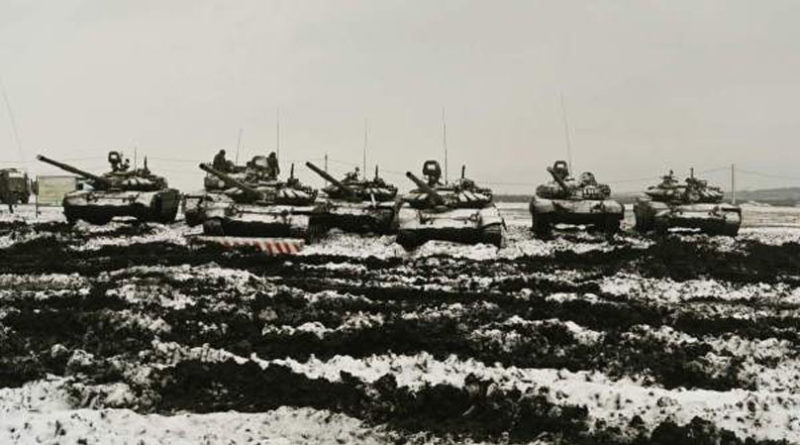India’s Stakes In Its Ties With Ukraine And Russia
31 Jan 2022
India has broken its silence on the crisis arising out of Russia’s military build-up on Ukraine’s border. What are Russia’s intentions, why is the West concerned, and what are India’s stakes in its ties with each side?
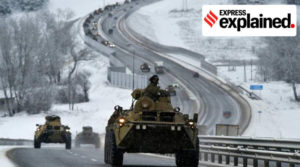
India this week gave its first official statement amid the ongoing tension between Russia and the West — led by the US — over Ukraine. It’s been a tense one-and-a-half months, with the possibility of war looming large.
What’s Happening?
Ukraine has become a bone of contention in Moscow’s relations with the West, with Russian troops massed near its border and NATO’s forces on standby in case Russia attacks its neighbour. Ukrainian forces have been patrolling the border in the east and the north, including in Chernobyl in Ukraine, which falls on the shortest route between Russia and Kyiv, Ukraine’s capital.
How did this start?
It began in mid-December when Russia told Western powers, including the US, that it had a list of demands.
Russia wants a guarantee from the West “in writing” to stop any further eastward expansion of NATO, the removal of NATO troops from Poland and the Baltic states, and the possible withdrawal of US nuclear weapons from Europe. The most important of its demands included that Ukraine should never be allowed to join NATO. The US and the West have ruled this out. The two sides are negotiating in Paris, in the presence of interlocutors from France, Germany, US and Russia. French President Emmanuel Macron has spoken to Russian President Vladimir Putin in a bid to resolve the crisis. US President Joe Biden too has had a video call with Putin.
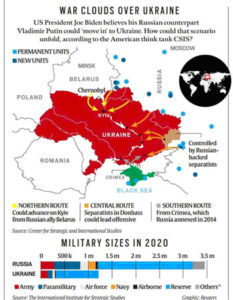
Source: Reuters
Why Is Russia Doing This?
The New Yorker’s editor David Remnick, who was the Washington Post correspondent in Russia between 1987 and 1991, has written a book, Lenin’s Tomb: Last Days of the Soviet Empire, in which he quotes Vladimir Lenin as saying: “For us, to lose Ukraine would be to lose our head.”
This has been the attitude of rulers in Moscow over the centuries, from the Tsar and the Bolsheviks to Putin.
Putin had called the break-up of the Soviet Union “the greatest geopolitical catastrophe of the last century”. Throughout his 22-year rule so far, he has sought to restore Russia’s influence in the countries that were part of erstwhile Soviet Union.
In an article on the Kremlin’s website (’On the Historical Unity of Russians and Ukrainians’, July 2021), Putin writes that Russians and Ukrainians were one people who shared a single “historic and spiritual space” and that the emergence of a “wall” between them in recent years was tragic. Ukraine disputes Putin’s version of history.
Of the 14 then republics whose control Russia lost when the Soviet Union collapsed in 1991, Ukraine was the most crucial one, since it was the second largest economy and second-most populous among them.
The Historical Connections
Historians say that Russia and Ukraine had been linked since the 9th century when Kyiv became the capital of the ancient state of Rus. From 1654, the two were united by treaty under the rule of the Russian tsar. They speak closely related languages and later formed, with Belarus, the Slav core of the Soviet Union.
Historian Serhii Plokhy, a professor of Ukrainian history in Harvard University, wrote in The Financial Times that it was during the mid-19th century when, in order to accommodate the rising Ukrainian national movement, Russian imperial thinkers formulated a concept of the tripartite Russian nation consisting of the Great Russians (or Russians in today’s understanding of the word), Little Russians, or Ukrainians, and the White Russians, or Belarusians.
When the Tsar’s empire collapsed after the revolution led by Lenin, the Ukrainians created a state of their own and declared independence in January 1918. Although it turned out to be short-lived as the Bolsheviks took control over most of Russian Ukraine in 1920, that two-year period planted the seeds of independence among the Ukrainian people.
“The Bolsheviks were forced to recognise Ukraine as a separate nation and even grant a pro forma independence to the Ukrainian Soviet republic,” Plokhy wrote.
Later, Ukraine played a key role not only in the creation of the USSR but also in its dissolution. It was the Ukrainian referendum of December 1 1991, in which over 90% of participants voted to leave the USSR, that spelt the end of the Cold War superpower.
Economics too played a role: Russia could not bear the burden of the Union without its second-largest economy.
The Geography And Resource Angle
After Russia, Ukraine is the second largest country in Europe too. It has major ports on the Black Sea and shares borders with four NATO countries. Europe depends on Russia for about one third of its natural gas – providing enormous leverage for Putin in any dispute with the West – and one of the main pipelines passes through Ukraine. Controlling this Ukrainian territory would enhance Russia’s pipeline security.
The West Comes Into The Picture
Since the Cold War ended in the early 1990s, NATO has expanded eastward by taking in 14 new countries, including some that were part of the Soviet Union. Russia views this as a threat, and feels the West is not respecting the non-threatening commitments made in the early 1990s.
Ukraine is not a NATO member but has an assurance made in 2008 that it will eventually be able to join. After a pro-Russian president was removed in 2014, Ukraine has come closer politically to the West. It has done joint military exercises with NATO and been delivered weapons including US anti-tank missiles. This, according to Kyiv, has been done to boost Ukraine’s defence after Russia annexed the Crimea region in 2014 and reportedly provided support to separatists in eastern Ukraine.
Putin says NATO may use Ukraine as a launchpad for missiles targeted at Russia. Taras Kuzio, a British academic, wrote on the Atlantic Council’s website, “The real cause of today’s crisis is Putin’s quest to return Ukraine to the Russian orbit. For the past eight years, he has used a combination of direct military intervention, cyber attacks, disinformation campaigns, economic pressure, and coercive diplomacy to try and force Ukraine into abandoning its Euro-Atlantic ambitions. The failure of these efforts has led us to the current confrontation, with Russia now warning of ‘military-technical measures’ if it does not succeed in re-establishing its dominance over Ukraine.”
Where Does India Stand On This?
India made its first statement on the crisis on Friday, articulated by Ministry of External Affairs’ official spokesperson Arindam Bagchi at the weekly briefing on Friday. In response to questions, he said, “We have been closely following the developments relating to Ukraine, including the ongoing high level discussions between Russia and the US. Our Embassy in Kyiv is also monitoring local developments. We call for a peaceful resolution of the situation through sustained diplomatic efforts for long term peace and stability in the region and beyond.”
Why Now?
On January 19, US Deputy Secretary of State Wendy Sherman called up Foreign Secretary Harsh Vardhan Shringla and discussed “Russia’s concerning military build-up on Ukraine’s borders”. New Delhi did not issue an official statement then, choosing to closely monitor the developments, but has now finally broke its silence.
With key strategic partners on both sides, India can’t afford any hasty moves hurting its vital stakes. While there is concern about Russia’s “muscle-flexing”, New Delhi does not want to jeopardise its close military ties with Moscow, particularly amid the stand-off with China on the eastern border.
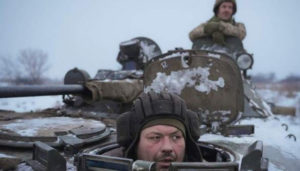
Ukrainian’s drive in an armored personnel carrier near front line position in the Luhansk area, in eastern Ukraine, Jan. 28, 2022
What’s At Stake?
The historical relationship goes back seven decades. While it has stagnated in some areas and atrophied in others, the strongest pillar is defence. Although New Delhi has consciously diversified its new purchases from other countries, the bulk of its defence equipment are from Russia: Estimates say 60-70 % of its supplies are from there.
Prime Minister Narendra Modi has held informal summits with the heads of only two countries — Putin and China’s Xi Jinping. Now Russia has emerged as a key diplomatic player amid the tension between India and China.
India’s foreign and defence ministers have negotiated with their Chinese counterparts in Russia in the last year and half. Russia is also key to India’s engagements in Afghanistan, after Kabul fell to the Taliban.
Ties With The West
Those are crucial too. The US and Europe are both important partners from India’s strategic calculus. Many American platforms have been used for reconnaissance and surveillance along the India-China border. Winter clothing for 50,000 troops has been sourced from these Western partners.
Is India Worried About The Russia-China Axis?
India is indeed conscious that the hostility between the West and Russia may push Moscow in the direction of Beijing.
The West’s approach towards Russia after the annexation of Crimea in 2014 brought Moscow much closer to China. India has always felt that it was the West that enabled this with the anti-Chinese rhetoric from Washington and the collapse of oil prices, making Russia increasingly dependent on Chinese consumption. Western analysts see this as a “friendship of convenience” between two countries led by strongmen.
Beijing and Moscow, however, do not always see eye to eye with each other. China does not recognise Crimea as part of Russia, and Moscow, formally speaking, takes a neutral stance on Beijing’s claims in the South China Sea.
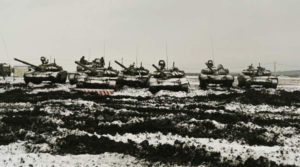
Russian tanks T-72B3 take part in drills at the Kadamovskiy firing range in the Rostov region in southern Russia, Jan. 12, 2022.
Other Concerns For India
There is an Indian community in Ukraine, mostly students in medical colleges. The Indian Embassy in capital Kyiv has started collating information on them, as part of preparations for possible hostilities. As per government estimates, 18,000 Indian students were in Ukraine in 2020, but the numbers may have dipped due to Covid lockdowns and classes moving online.
India’s Stand
When Russia had annexed Crimea, India had expressed “concern” but also qualified it by talking of “legitimate Russian interests”. Putin had thanked India for taking a “restrained and objective” stand, and called up the Prime Minister Manmohan Singh to express his gratitude.
Keeping in mind its ties with Russia, sources said, India hasn’t issued any condemnatory statements as is being done by the Western powers. For now, New Delhi is hoping that the situation will be resolved by skilled negotiators on both sides. CIA chief William Burns has handled several such tough talks in his previous diplomatic roles, while on the other side is Russian Foreign Minister Sergey Lavrov.
Courtesy: IE

